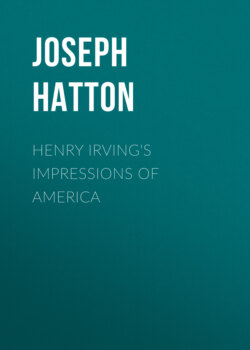Читать книгу Henry Irving's Impressions of America - Joseph Hatton - Страница 22
На сайте Литреса книга снята с продажи.
III.
ОглавлениеTable of Contents
The first week in New York was, in a great measure, spent between the theatre and the hotel. Invitations to dinner and receptions were, as a rule, declined. The exceptions were breakfasts given by Mr. Vanderbilt and Judge Shea. Many distinguished persons called. All kinds of polite attentions were offered, some of which it is to be feared Irving had not time or opportunity to acknowledge as he could have wished. One gentleman placed his carriage at Mr. Irving’s disposal; another offered to lend him his house; another his steam launch. These courtesies were tendered gracefully and without ostentation. Flowers were sent regularly from unknown hands to the Hotel Dam. Miss Terry went driving with friends in the Park, and found the trotting-track a fascinating scene. Within forty-eight hours Irving was a familiar figure in the lower part of Fifth avenue and Union square, as he walked to and from the theatre. He and Miss Terry made their first acquaintance at Delmonico’s in company with myself and wife. An elegant little dinner, of which the ice-creams were its most successful feature. Artistic in construction, they were triumphs of delicate color. I think they were the chef’s tributes to Miss Terry’s supposed æsthetic taste. No wonder the Delmonicos made millions of dollars, when it is possible that the chief reminiscence of a dinner may be associated with the ice-creams and sweets. On Tuesday, after a rehearsal and a drive down-town on a pouring wet day, I piloted the new-comer to Sieghortner’s, in Lafayette place. This well-known café occupies the house in which the Astors lived. It is a building characteristic of the early days of New York’s first millionnaires—marble steps, heavy mahogany doors, rich Moorish decorations, spacious hall-ways. Close by is the Astor Library, a valuable institution, and the street itself has quite an Old-World look. It was once the most fashionable quarter of New York; but wealth has moved towards the park, and left Lafayette place to restaurants, boarding-houses, public baths, and stores. Sieghortner himself is a typical Dutchman, a veritable Knickerbocker of hotel-keepers, and a gourmet. He is almost the only “landlord” (as we would call him at home) in New York who will condescend to wait upon his guests. It is a pleasure to look upon his beaming face when you order a dinner and leave menu and wines to his judgment. As he stands by your chair, directing his attendants, he is radiant with satisfaction if you are pleased, and would no doubt be plunged into despair if you were dissatisfied. Shrewsbury oysters, gumbo soup, cutlets, canvas-back ducks, a soufflé, Stilton cheese, an ice, a liqueur, a dish of fruit, and a bottle of hock that filled the room with its delicious perfume.
“It was perfection, Mr. Sieghortner,” said Irving, as he sipped his coffee, and addressed the old man—“the canvas-back superb. You are so interested in the art of dining that you will appreciate a little experience of mine in connection with the great American bird—I don’t mean the eagle, but the duck.”
Sieghortner rubbed his hands, and said, “Oh, yes—why, of course!”
“An old American friend of mine—dead now, alas!—when he was in his prime, as they say, frequently had numbers of canvas-back ducks sent to London from New York. On the first great occasion of this kind he invited thirty guests to eat thirty ducks. He spent a day or two instructing the chef of a well-known club how to cook them. The kitchen was to be well heated, you know, and the ducks carried gently through.”
“Oh, yes, that’s the way!” said Sieghortner, rubbing his hands.
“Well, the night came. His guests were in full force. The ducks were served. They had a whitey-brown and flabby appearance. Bateman cut one and put it aside. He tried another, and in his rage flung it under the table. The dinner was an utter failure.”
“Dear! dear!” exclaimed Sieghortner.
“My friend did not forget it for months. He was continually saying, ‘I wonder how that fool spoiled our ducks; I have tried to find out, but it is a mystery.’ Nearly a year afterwards I heard of the chef’s sudden death. Meeting my friend, I said, ‘Have you heard of poor So-and-so, the chef at the club—he is dead!’—‘I am very glad of it!’ he exclaimed. ‘Do you know, he cooked those ducks over the gas!’ ”
“Dear! dear!” exclaimed Sieghortner, a quick expression of anger on his face, “why, he ought to have been hanged!”
